China Cycling Travelogues
Do you have a China cycling travelogue you would like
to share here?
Contact us for details.
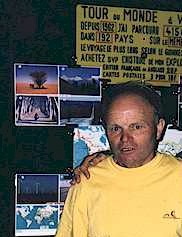
Guinness Book of Records holder
"Epic Journeys"
Around the World by Bicycle - Part 5
Copyright © Heinz Stücke, 2000.
This followed by 3 days of excitement in Banaue - Philippines where my bicycle was stolen for the forth time. How the police recovered it in a village, 50 km away remains a mystery to me. The thief said he "found" the bicycle unattended and only took it for "safe keeping", destroying the lock and other things in the process. He had the nerve to ask for a reward. It was only in April 1988 that I finally set foot on the Chinese mainland. China became the country where I spent more time and cycled more miles than in any other country. My circles inside the country became increasingly larger to encompass every province and in the end included neighbouring countries like Mongolia, Pakistan, India, Vietnam and Laos.
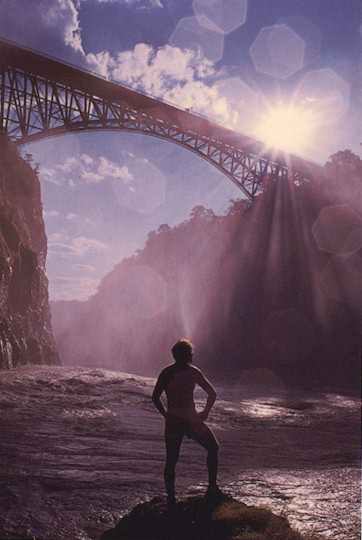
In China alone I cycled some 35,000 km in 580 days. To do this in China I had to learn to travel differently. Primarily I had to learn that information can not easily be obtained from the people by the spoken word alone. The most simple situations can be frustrating. For example. I was at a crossroad, there were four directions and no signposts. I was about 20 km from Chengdu, capital of Sichuan Province. I pushed my bike to the policeman in the middle asking helplessly "Chengdu? Nali? Where?" pointing in various directions. His face showed no comprehension, when I repeated, he turned to denial. I repeated it again, he said "mei you, mei you" (don't have) energetically. Chengdu, written in Chinese, shown on a map, would have solved the problem quickly. To find my way I tried to have as many different and detailed maps as possible.
China is a patchwork of open and closed areas. Most countries in the world have the policy: Everything is open to travellers except what is closed, but in China it is the other way around: Everything is closed, except what is open. Furthermore no visitor to the country is supposed to bring his own transport. These two stipulations made almost my every move in the country against the law. How on earth could I have possibly got away with 580 days and 35,000 km? Because in China the course of daily life is one thing and what the law says is another. Rules are broken endlessly by everyone in society and in all spheres of existence.
I feel about as guilty for travelling the way I did as does a Chinese person for cycling on the wrong side of the road. The problem starts when the arm of the law decides otherwise. To state an example, punishment can be severe for local people for minor wrong doings. Foreigners may get a warning, pay fines, have their bikes or cameras confiscated or be sent out. of the country. Each one was dealt out to me in the course of my travels in China. There is no coordination between the various security organisations, no central computer. 50 km away you can start anew. Once out of the country you can get another visa and enter again, if necessary the next day.
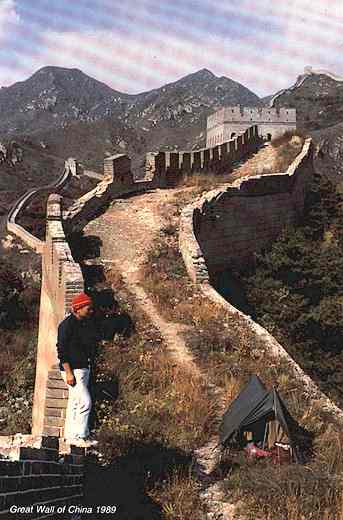
Chinese people can be incredibly generous and friendly, but it has to be on their terms. You may be overcharged in the morning and showered with gifts in the evening "by the same person". It is important to keep in mind that it is their country, their customs, their way of life that you participate in. And it is up to you to adapt to it, and that is the difficult part.
With changes in the former communist block I finally saw my chance of cycling in Russia as well. That was always denied before.
Mongolia's National Sports Festival "Nadaam" was coming up. A last minute train ticket and visa for Mongolia was obtained through "Andr?s Monkey Business" in Beijing who specializes in Trans-Siberian train journeys.
Competitions in Ulaanbaatar were held in the so called "three manly" sports of Mongolia: Wrestling, Archery, and Horse racing. (but horses are ridden by children). While waiting for the Russian visa I cycled through the open spaces to the west. 1,500 km to Hovd then took a flight back to Ulaanbaatar.
I was not much attended to in the Russian Embassy in Ulaanbaatar on the day I was to received the visa. The reception room personnel were watching a TV screen, where a sombre looking woman was reading names from a list. Then somebody said to me; "you know, there is a coup in Moscow!?"
Later Mr. Karalov came and handed me my visa: "It does not need to concern you!" he said. Riding to the border I was first refused entry. The second border, 20 km away, was heavily guarded. Past watchtowers and pointing guns I was ushered by soldiers to the entry point. After several hours of waiting the go ahead was given.
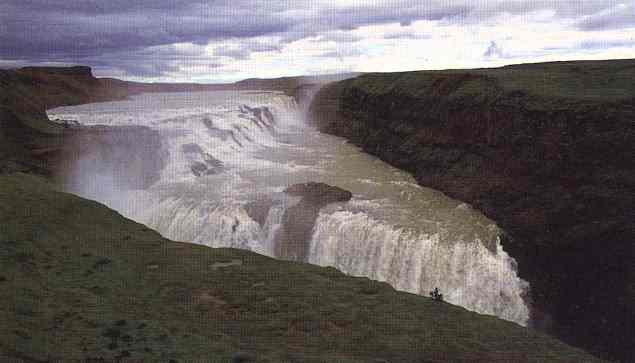
I headed for Almaty 5,000 km away. The road followed the rail line and was mostly good. Food was easily obtained in the villages along the road (sometimes even smoked Salmon or Caviar - cheaply bought with hard currencies). After Novosibirsk I turned south into Kazakstan and reached Almaty with no difficulties. Flights and trains got me back to Beijing. And then it was one more time down to Hong Kong to escape the winter in the north, to write many letters, to rebuild my bicycle, to see Mr. Lee and to focus my vision on all the countries to come…
My story may sound like a continuing string of adventures, but you have to keep in mind that 33 years is a long time and I have tried to put so much into just a few pages. Of course one tries to tell about major events and it is difficult to describe the times in-between. I did not cycle continuously. I would often leave the bicycle behind and use other forms of transportation. Although I cycled about 385,000 kms I also travelled by train, plane, boat, bus, car etc. for another 600 to 800,000 kms.
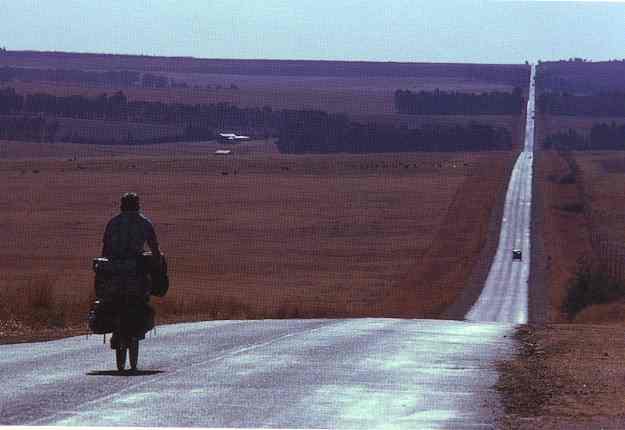
When I finish travelling - maybe in 1970-1980-1990-2000? - I would be happy if I could make a living out of my experiences, by giving slide shows-writing a book-selling my photographs, or whatever; Anyway the big question is; "Will I finish?"
I cannot recommend that everyone should do as I have done. It depends on the individual. Anyone can do it. Determination, consistency and imagination are more important than mere physical ability. You have to forget about comforts and having a family. You have to do it early, before you have responsibilities and before you become a slave to your environment. You have to be completely free.
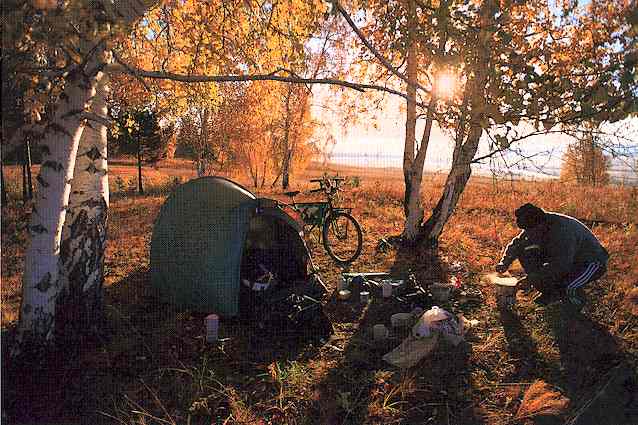
Would I do it all over again? No! I never liked to cover the same terrain I've already conquered. IT'S THE UNKNOWN AROUND THE CORNER THAT TURNS MY WHEEL…
My travels have continued since this booklet was first printed in 1992. In North Korea, I rode my bicycle only to the border post (a distance of some 500 meters). There I was stopped from cycling any further. Instead, I was chauffeured around for seven days with a guide and 'taken good care' of. Not used to travelling in style I even enjoyed it. The only painful thing was the US$ 1000 price-tag, that came with it! At the North Korean-Russian border, they didn't want to let me in at first. The visa didn't mention the border crossing point. But the chief of border guards was a friendly person. After sharing his chicken and vodka with me he let me off the train and into his country. Then I was on my own. In the eighteen months that followed, I cycled 21,000 km through every one of the fifteen new countries of the former USSR. I also went to many of the republics within Russia itself. E.g. Karelia, Komi, Tartastan, Chechenya, Osetia, Dagestan, Kalmyk, Yakutia, Tuva, and more.
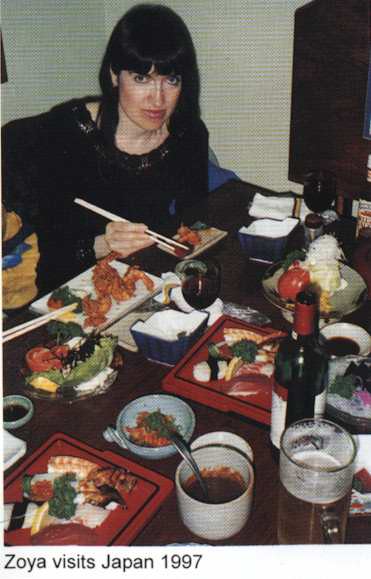
I crossed the borders of the numerous republics so often that I lost track. At many of the new borders I didn't need to show my passport. For much of the time I didn't even have a visa. I entered on a fourteen day Russian transit visa which was generously extended by four months in BlagoveshenSkl (Never heard of such). Of course, all of this would never have been possible before the fall of the former regime. People in all the regions I travelled through were very unhappy with the present situation. There were very few Western travellers. I can count on my two hands the ones I met in 18 months (except in Moscow). Can you imagine arriving at a restaurant (mentioned in the Lonely Planet guide), where the owner called me the very first one. He was so glad that he invited me for a big meal and drove me around in his Mercedes. (Pskov, 22-2-93).Of course, Russia 'is not complete without: 'From Russia with love'. Actually she is from Belarus. When we met I was taking pictures on a bridge. Looking into the pond below I heard a sharp voice: 'What are you doing there?". The KGB? No, two pretty girls standing behind me. One of them, the English speaker, is Zoya. 'It's none of your . She is too pretty. We make an appointment. We meet again. She says she loves me. She is 36, divorced and has a daughter of 11 years old. We subsequently travelled together to some places by train. Among other places to Vorkuta (January 93), a coal mining town north of the Arctic circle. It was –30 degrees Celsius and blowing. Sometimes she joined me in places where I had previously arrived by bike. She also joined me when I arrived in Kyrgyzstan. From Bishkek we traveled by train to Hong Kong, from where she has since returned to her home in Minsk. Next I decided to go to Albania, one of only five "not yet seen countries". Having tried to enter in vain four times during the crazy days of Enver Hoxha dictatorial rule one now arrives there easily and without visas. An amazing 300,000 concrete bunkers "large and small" dot the land. They were built to defend the country against imagined enemies. It is said that one bunker has the material for 4 flats and there are 10 inhabitants in Albania for every bunker. Many flats could have been built instead. Threading my way up through previously only poorly visited countries in Eastern Europe I arrived once more in Minsk.
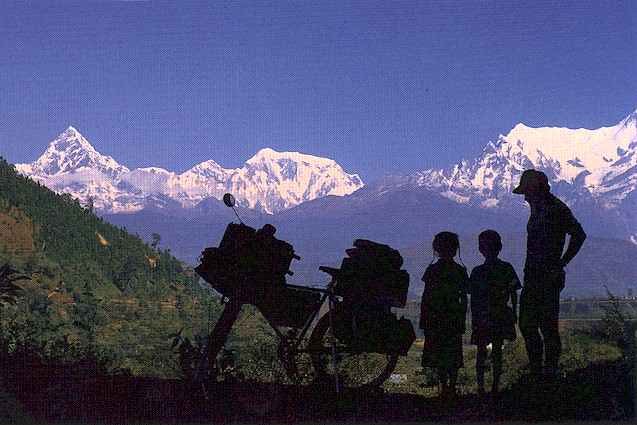
For years I had been wanting to do Norway's spectacular coastal route but always quickly postponed it as "too expensive" or "too cold" or to be done when I am rich and/or old. But now it suddenly seemed the time to go. The approach route was exciting too. It's a long haul up from Minsk via Karelias Lakes and beautiful Kishi churches to Murmansk, Russia's large northernmost city (69 degree Lat.)
Battling rain snow' and winds during 4 months and for 4000 km Norway lived up to bad reputation regarding weather but also up to my best expectations of beauty. Later in London while doing inventory of about 28,000 slides stored with F. Spooner Pictures, money was made available for a new journey to Africa. Previously elusive countries like war torn Angola now seemed possible and Aeroflot had cheap tickets to a number of destinations there. As all flights were via Moscow (and stop-overs permitted) I could conveniently visit Zoya again (increasingly important).
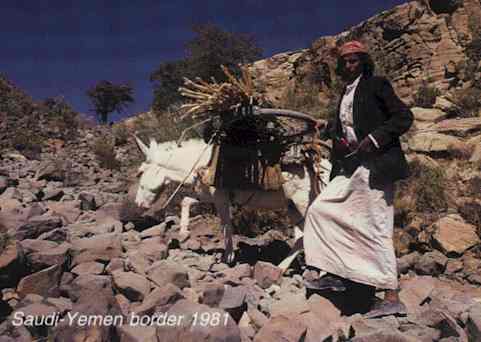
Many returning Africans were crowding the Tu 154 airplane on the way to Duala. Not welcome anymore in Russia nor supported by their own countries many were left stranded in Russia without even the means to get to their home countries. My plan was to go first to tiny Sao Tome and Principe 320 km off the coast of Gabon. I planed to reach the islands by boat from Libreville. Every other day the boat was supposed to go. Five weeks later when it finally did I was fuming, having spent too much on food and accommodation in expensive Libreville. To top it all the difficult to get, US$100 visa for Angola had expired. Angola, still short of a full peace agreement nevertheless had a lull in the confrontation of the opposing sides but guns and Kalashnikovs could be seen and heard everywhere even slung on shoulders of small shepherd boys. But I never felt threatened. I cycled on routes that were considered safe and cleared of land mines, but could be in terrible condition otherwise. Assistance was offered along the way by passing vehicles, often aid organizations or truck drivers. Approaching the Namibian border I found the road side littered with destroyed and rusting military vehicles a reminder of battles fought here in the 80-ties between South African forces and Cuban Russian assisted government troops. The Caprivi strip in Namibia provided an access route towards the other side of Africa. Much needed rain was falling all over the northern part of the RSA.
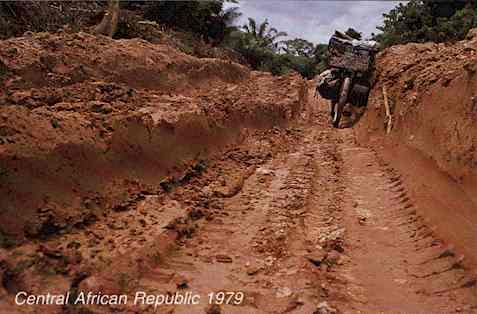
It reminded me of the miserably wet days in Norway the previous year when I wouldn’t get out of my tent for two or three days d in a row. Denis, an Irishman, had given me a lift to Jo-Burg in his small Cessna. That made it possible to include Maputo, the capital of Mozambique in my tour of that country. The southern n summer made riding uncomfortably hot. I was washing naked under a bridge in the middle of a nowhere one day when a swarm of angry bees suddenly attacked me. It was the second such terrifying attack after one in 1984 in "The Gambia". When the poison got into my system there was a strange tingling all over my body, I fell to the ground and lost all control of my body functions choking and screaming and rolling from side to side in the dirt!Some hours later natives hinted it might have been the soap I was using that made the bees so angry. Should I sue the soap maker?Although the Comoros are only a short distance from the mainland in Mozambique there was no way of getting there except from "way up" Nairobi or "way down" Johannesburg. The Comoros made the world news only a little earlier with yet another "coup d' etat" but the situation was quiet again after the intervention by French forces. I couldn't possibly give the-country a miss but was miffed by the high US$445 return flight from Nairobi and unhappy by high prices in general and high temperature. I stayed just 7 days and only on the main island of Grande Cormoro.
And that left only one last country to visit. The Seychelles where even more expensive. Kenya Airways gave 25% discount on their flight in return for some publicity. I cycled along the beautiful coastline of Mahe and Praslin. There wasn't the money to celebrate, neither did I much feel like celebrating. And so what? Previously neglected issues caught my attentions while I was still in the Seychelles. What about some countries done only so briefly that I am ashamed to mention them. 3 hours in Liechtenstein? 1 hour stopover in Qatar? A few hours across the border from The Emirates into Oman or similarly at Puntsholing into Bhutan? O.K., they didn't let me go any further: But I could try again?! And I want to see Greenland too. All copyrights reserved.
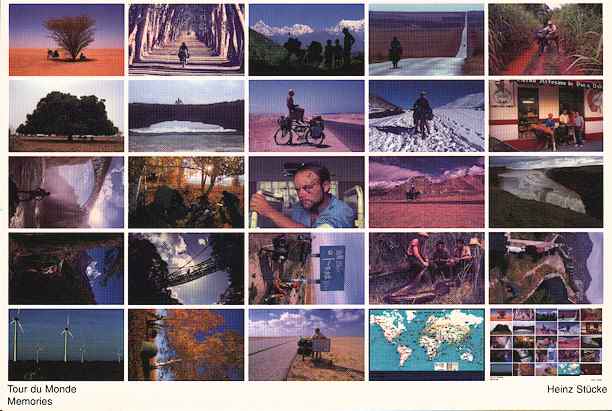
You can reach me here:
Heinz
Stucke
Facts & figures as of May, 2006
66 years old
545,000 km cycled
193 Countries seen
63 Territories, Regions or Associated States, etc. visited
44 years on the road
80 to 120km/day
Same 25 kg 3-speed bike (but some recently on a BikeFriday - the "Pino" of Hase and Rando of Paris)
6 times Bike stolen and recovered - most recently in the UK
40 to 50 kg Luggage
18 Passports filled
4 Car accidents
16 Bike frame breakdowns
80,000 Slides/photos taken
80,000 Booklets sold
1940 Year of birth
1963 Met Emperor Halle Selassie
1969 Honorary Citizen of Jackson, Alabama
1994 Became Godfather of Jack Stroud, London
1995 to 99 Guinness Book of Records:
"Most Travelled Man in History"
You are invited to prove me wrong.
For an interesting article by Ron Gluckman on Heinz go here:
http://www.gluckman.com/Bikeman.html
Help keep Heinz Stucke rolling!
Make a donation here to his PayPal account!
Skip to: Heinz Stücke - Page 1 | Heinz Stücke - Page 2 | Heinz Stücke - Page 3 | Heinz Stücke - Page 4 | Heinz Stücke - Page 5
Bike China Adventures, Inc.
a href="index.html">Home | Guided Bike Tours | Testimonials |
| Photos | Bicycle Travelogues
| Products | Info |
Contact Us
Copyright © Bike China Adventures, Inc., 1998-2012. All rights reserved.
